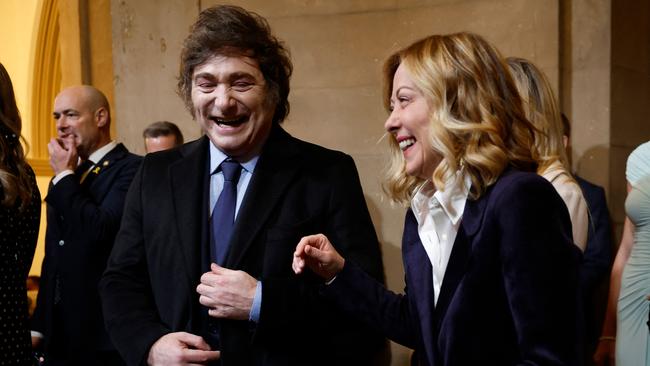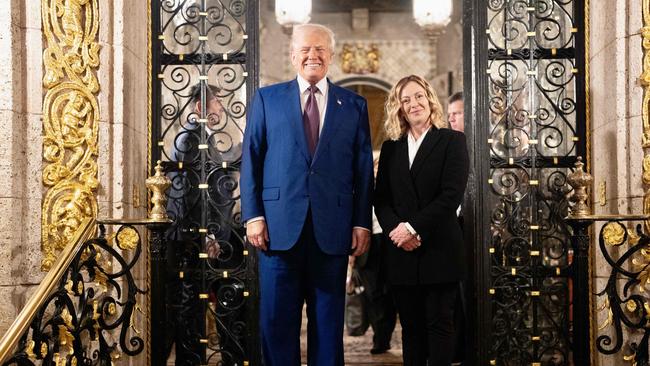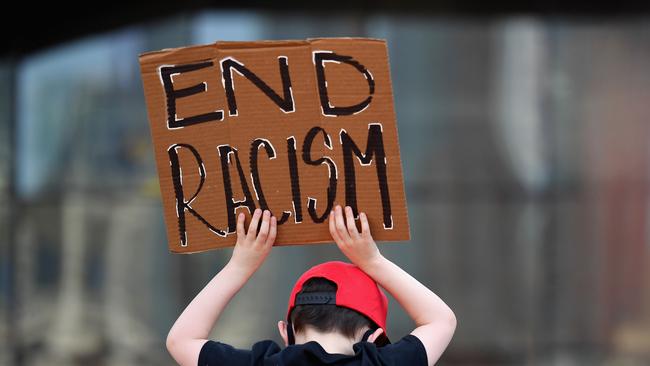Populist revolution may yet save elites from themselves
Progressives have, ironically, regressed so far into extremism that it’s at risk of dying.

Liberals, in the American sense of that word, progressives in Australian parlance, despair that these people are bringing to an end a glorious historical period and instead installing a new and bleak period where nationalistic “beggar thy neighbour” policies replace global adherence to universal liberal truths.
The truth is rarely that simple. For starters, the words “liberal” and “progressive” need to be replaced. Many are illiberal and regressive. Turning to the populists, one doesn’t have to agree with every act by Trump or Meloni to recognise that, on a number of fronts, they embody a commonsense policy pragmatism that is not only popular – as opposed to populist – but likely to be effective and long lasting.
The 21st century dominance of the internet and its fostering of universal access to news and opinion has given figures such as Trump, Meloni, Farage, Le Pen and the rest platforms and public awareness they could never have imagined even in the second half of the 20th century.
Dour critics put their rise down to populism. I say it’s no more than a democratisation of policy making – a popular revolt, if you will, against the dominance of liberal elites in policy making. As social media makes the opinions of the average person available to all, and as it creates the loudest and most opinionated public square known in human history, elites cease to be the dominant voice. Elites may bemoan the fact this process publicises and legitimises what they would describe as populist views, but perhaps these views act as a highly desirable and long overdue corrective to the incestuous groupthink so long favoured by progressive elites.

Take immigration. For decades, liberal elites lionised something very close to an open border policy. Who could forget the canonisation of Angela Merkel for opening Germany’s doors to Syrian and other refugees? Humane it was. In the short term, it helped alleviate a wicked problem.
However, the shortcomings of such an approach have rapidly become clear. Open slather to the small boat armadas that once assailed northern Australia, and can now be seen off the cliffs of Dover, lacked what today’s ESG advocates might call a “social licence”. The popularity of the AfD in Germany, with its tough-on-migration policies, is a symptom of the lack of popular support for Merkel’s immigration policies. Brexit was, in large measure, also a symptom of the elite embrace of porous borders and generous asylum-seeker policies that had not been socialised with, and had not been agreed to by, the incumbent population.

By contrast, Australia’s post-war immigration boom was managed with greater care and skill, and significant rigour, so that the electorate by and large strongly agreed with it. It was a significant success because it had been socialised with the electorate, and stringently policed so Australians understood that the government, not people smugglers, were calling the shots.
Liberal elites nearly always regard the concerns of so-called populists about immigration as evidence of a knuckle-dragging dumb electorate. But the popularity of immigration sceptics demonstrates that they, unlike the liberal establishment, understand what it takes to make immigration programs work. The so-called populists, not liberals, understand the need for a social licence.
The 21st century and the rise of social media has facilitated a revolt against the 20th century Utopianism of liberal elites. Fellows such as Trump have, by and large, sidelined mainstream media, avoiding the sneering filters of left-wing journalists on CNN and the like.
Ironically, populism may be liberalism’s saviour.
Liberalism is a rights-based project founded on fine-sounding declarations of universal human rights. Liberals love nothing better than sweeping international human rights conventions expressed in stirring language. Unfortunately, these rights, and thus the core beliefs of liberalism, are expressed in the highest levels of abstraction. Even more unfortunately, when translating these generalities into practical, day-to-day policies, liberals often get it terribly wrong. Their high-mindedness and idealism frequently push them one step, and sometimes many steps, too far.
Liberal elites will take a noble-sounding ideal and turn it into an unlimited and unconditional right with little regard for practicalities and less regard for what the average person thinks reasonable.
The rights of asylum-seekers are one example where a little more attention paid to popular opinion might have preserved the social licence of the waves of immigration we are seeing around the world. Critical race theory is another example where a laudable desire to avoid and eliminate racial discrimination has become a divisive obsession with race. In both areas, liberalism has been discredited when instead small, sensible concessions to common sense – read populism – may have saved it.

Liberals may well be motivated by the finest intentions when promoting transgender rights but, here again, spurred by activists, the establishment went well beyond sensible limits. As The Free Press’s Emily Yoffe wrote this week, “Until Friday afternoon, Dr Eithan Haim, 34, was facing a potential decade in federal prison for revealing publicly that Texas Children’s Hospital was continuing to perform gender transitions on children even after declaring a moratorium on the controversial practice”.
Federal prosecutors have now dropped all charges with prejudice, meaning the doctor who tried to protect children from gender reassignment cannot be recharged. “Haim … had run afoul of the Biden administration’s unquestioning support of medical transition of young people distressed about their gender,” wrote Yoffe.
Would this have happened if Trump were not US President?
It’s possible that Trump’s rise to the White House, and his policies, will rescue liberalism from itself. Certainly, something is needed to stop liberalism eating itself.
Could the 47th US President, unlike the 45th president, be the necessary antidote to liberalism gone awry? The popular uprising against DEI, and identity politics generally, is in its early days but the swell is gathering. The promotion of censorship by the liberal establishment, the cheering of a right not to be offended, these fads that undermine free speech are also in retreat. Even Facebook has joined the free speech party, with Meta’s Mark Zuckerberg doing away with third party “fact-checking”, loosening their “hate speech” restrictions. The tech giant is even relocating some of its business to Texas.
Economically, the very early days of the Trump presidency suggest voters and markets, while ambivalent about tariffs and trade wars, certainly love the deregulatory trends that liberals hate.
And even climate policy is being examined with a rigour and an open mind one would never see or hear at Davos.
It is still too early to declare victory, or even definitive trends in the victory of so-called populism over elite liberalism, but it is clear that some historical epochs are ending. To be sure, some of Trump’s acts are crazy. Removing personal security for former secretary of state Mike Pompeo and former national security adviser John Bolton is vindictive and, worse, dangerous. Both men, responsible for staring down Iran under Trump, are targets for Iranian despots.
But perhaps it takes a deeply flawed political character to take the other necessary but controversial measures that most risk-averse politicians wouldn’t dream of doing. Caution is not part of Trump’s make-up. And he’s in a hurry. For every imprudent decision by Trump, there may well be a dozen sensible ones over the next four years that may help bring an end to the global pinnacle of wokeness so evident in the first two and a half decades of the 21st century.
Somewhere in this Trump project is a return to values over fads – an imperfect project, to be sure, but more promising than the steady decline of genuine liberal values under nutty left-wing professors, “equity” activists, corporate rent seekers and lovers of big government.
The Times’s James Marriott wrote recently that we’re living through the end of “the long 20th century”. But what if we’re living through the end of the short 21st century? The political, social and cultural fads that took hold in the past few decades, ones that might have grown even less sensible over this century, may have peaked. And Trump is a symptom of those restless animal spirits that have been bottled up inside many democracies for the past few decades.






Lately, liberal elites have stepped up their denunciation of so-called populists. Donald Trump, Javier Milei, Georgia Meloni, Nigel Farage, Marine Le Pen and the like are especially in their sights.